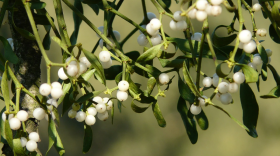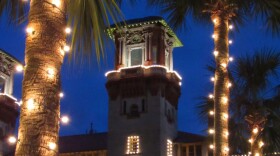Today's holiday traces back to Samhain, one of four seasonal Gaelic festivals. Samhain marks the end of harvest season when pagans honored their deceased with bonfires, dressing up in costume and even visiting neighbors to recite poems in exchange for food.
“I love Halloween. However, I do feel like the meaning behind it has shifted," said Andrea Ramos, a local psychic medium. "Some people are very scared of it, some religious belief systems that believe that it's worshipping the devil and, and that's not what pagans are out there doing.”
In the 9th century, the Western church claimed November 1 as All Saints Day. Later, November 2 became All Souls Day. The Irish brought these holidays, including, All Hallows Eve to American shores. The Rev. Jarek Sniosek from St. Leo Catholic Church in Bonita Springs takes us back in time:
“The word Halloween comes from All Hallows' Eve, the evening before All Saints Day, which is a holy day honoring all saints in medieval times. Christians would prepare for All Saints Day with a vigil, a night of prayer and fasting, reflecting on the lives of the saints who have gone before us.”
Celebrations evolved into masked teens playing pranks. But after too many shenanigans, communities struck a deal with revelers — treats for peace. By the 1930s, "trick-or-treat" was no longer a threat; instead, it was a password to a night of sugary diplomacy. Sniosek says there is more to the holiday:
“For us Catholics, the season holds a much deeper significance that extends far beyond costumes and candy. Halloween, All Saints Day and All Souls days actually are intertwined now for us by a common theme, remembering our connection with the communion of saints and reflecting on eternal life with God. So, you know Halloween, as we know it, actually has Catholic roots.”
Celebrating both life and afterlife is a common religious theme, says Ramos:
"If you're pagan, if you're Wiccan, if you're Jewish, Catholic, you know, Hindu, whatever it may be, there's beauty in all of it. And so really, just being accepting of what each other is involved in, and if you're not interested in it, then, you know, just turn your cheek and then just allow them to embrace their belief systems, right?”
WGCU is your trusted source for news and information in Southwest Florida. We are a nonprofit public service, and your support is more critical than ever. Keep public media strong and donate now. Thank you.








